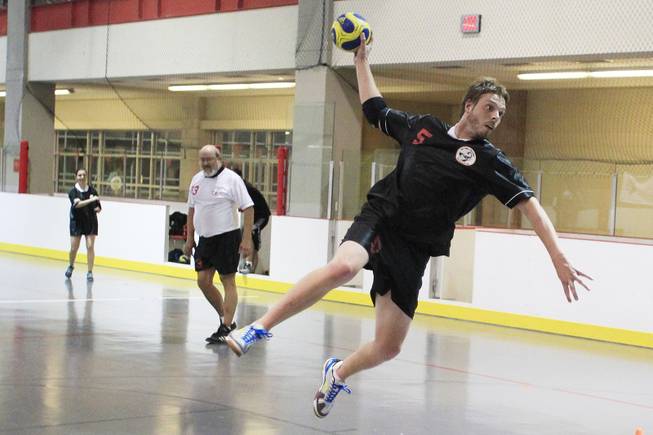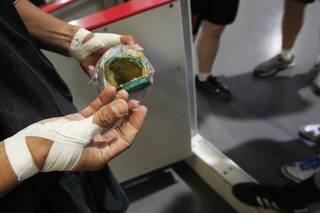
Sam Morris / Las Vegas Sun
Jamie White leaps to try and score during a Las Vegas Scorpions team handball practice Wednesday, Aug. 1, 2012.
Friday, Aug. 3, 2012 | 2 a.m.
Related content
- Berth on U.S. team for London games puts hammer thrower ahead of schedule
- Las Vegas Strip offers new opportunities for former Olympic athletes
- Sweat poured out on BMX courses in valley paves way for trip to London
- Gold is goal, but experience in London will be paramount for two-time Olympian
- Las Vegas nurse relishes being part of Olympic torch relay, looks forward to games
- Michael Hunter hopes to fulfill dreams — his and his father’s — with Olympic gold
- Sun editorial: Olympic spirit
- Where I Stand: Games bring more than sports
Are you watching this summer’s Olympic Games in London and dreaming of one day representing the red, white and blue on sports’ biggest stage?
Bernhard Schneider is confident he can help you become an Olympian.
But you’ve got to like handball.
Schneider is the coach of the Las Vegas Scorpions team handball club and one of the sport’s respected veterans in the United States. Each Wednesday at the Student Recreation and Wellness Center at UNLV, he teaches beginners about the nuances of the sport and fine-tunes the skills of more experienced players who have played in clubs in their native countries where handball is more popular.
The scene at UNLV is pretty common across the nation, which partially explains why the Americans rarely qualify for an Olympic berth.
The club has about 20 members. Most are in their 30s and 40s, they play on a court that’s not close to regulation size because there simply isn’t a handball-specific facility in town, and the pace of play typically is hindered by the players’ inexperience and lack of fitness.
If it were up to Schneider, the court would be packed with college-age players in top shape. Like in his native Germany, where the sport is popular, handball here would be fast-paced, high-scoring and competitive. And, more important, if those younger athletes dedicated themselves, they’d have a legitimate chance to represent their country.
“If you are a high school kid and you take a shot at playing this game, and you take it seriously, you are instantly one of the top 100 players in the country,” said John Ryan, the Las Vegas Scorpions president.
The winner of the Pan-American games earns the Olympic berth, which usually is won by Brazil — one of the non-European nations that plays quality handball. But, with Brazil automatically earning a spot in the 2016 Olympics because it will be the host nation, the opportunity for the Americans to qualify gives Schneider a legitimate selling point.
“I’m proud we have so many Americans” in the club, said Schneider, who has been the U.S. Olympic Festival coach. “If only we could get a few younger ones out here.”
Half of the battle is getting the general public to realize what the sport is. A majority think handball is a solo sport played on a racquetball court where competitors essentially play racquetball with their hands. So, only in the United States, the word team is placed before handball when talking about the sport.
“We’ve always had this semantics problem in the United States,” Ryan said. “I don’t know how many times I’ve had to explain to people what this is. It’s water polo without the water or lacrosse without the sticks.”
And, on Wednesdays at UNLV, the handball being played is a slight variation of what you’ll see while watching the Olympics. A regulation court is 40 meters long by 20 meters across, but the Scorpions are forced to practice on a much shorter spread at UNLV. The makeshift area is a roller hockey court in the corner of the facility, which means play is congested at times and the goalies are flooded with shots at a higher rate. Think of the Arena Football League’s 50-yard field in comparison with outdoor football’s 100-yard spread.
That makes Schneider’s job of teaching game strategy difficult. On a regulation court, the arch where attacking players aren’t permitted inside is 7 meters from the goal. At UNLV, cones mark the arch, which doesn’t stretch 7 meters at most points.
Still, you won’t hear the players complain.
They come from Germany, Serbia, Brazil, Mexico and Romania. Occasionally, the club will travel out of state for an exhibition or tournament, but for the most part it’s just friendly recreation on Wednesday nights. There is a $10 fee to work out at the facility and no immediate fee to join the club. Most members are males, but a few females are regulars.
“In all my years in handball, I have never found a bad person,” Schneider said. “Team handball is fun. It’s about having fun.”
Nick Erikson, 29, picked up handball while studying abroad in Denmark. He instantly was sold.
“I initially thought, ‘Man, this is the sport I should have been playing my whole life,’” he said. “There was a lot of tall and lanky guys like me, and you don’t get beat up as much as other sports.”
When one of those younger players do arrive, they are given hands-on lessons from Schneider and the team’s more seasoned players. They are more than willing to share the tricks of the trade.
“They are doing a fantastic job of learning,” said Nien Yeh, one of the club’s top players, who learned the game while living in Brazil. “They are showing a lot of good skills and ball-handling for just getting into (the sport).
“That’s one of the good things about this sport. It’s brings people together. No matter your race or gender, or what country you are from, everyone can play. The social aspects here are just as important as the physical.”
For more information on the club, visit its website.


Join the Discussion:
Check this out for a full explanation of our conversion to the LiveFyre commenting system and instructions on how to sign up for an account.
Full comments policy